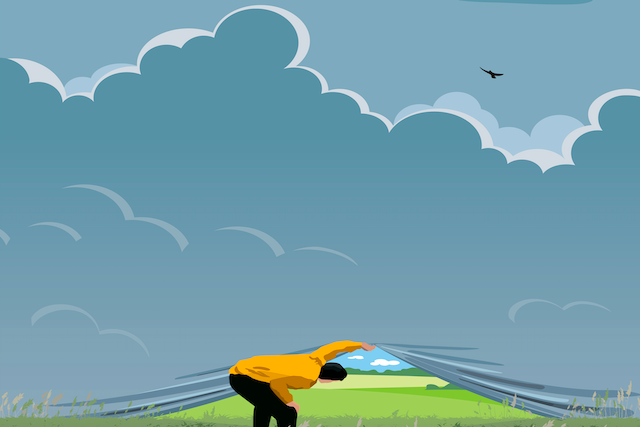
“I’m grateful for past betrayals, heartaches, and challenges… I thought they were breaking me; but they were sculpting me.” ~Steve Maraboli
I winced in pain as I climbed off the elliptical. This was one of the few times that I had ever set foot into a gym. And it was out of necessity rather than choice.
That necessity came from chronic lower back and leg pain, which I had been living with for the better part of six months. At the time, I didn’t know it would end up being just chronic, idiopathic pain.
All I knew was that it hurt, and I was limping with every step I took.
The pain had a definite impact on my quality of life.
For those first two years I could rarely sit for more than five minutes at a time, as a burning sensation would soon envelop my hip and thigh area, making it uncomfortable. The only way to alleviate the sensation was to stand. This was difficult for me, as I am an engineer who makes his living in front of the computer.
In my quest to get better I saw enough specialists to count on both hands. Because I lived in a small town, they were often two-and-a-half to three-and-a-half hours by car, one way! Imagine the challenges of trying to sit in a car for that long a period of time when the very act of sitting was uncomfortable for me.
Each time, the doctor would say that he didn’t know what was wrong with me. The good news, at least, was that I was not in danger of dying anytime soon.
Little did I know at the time that I would find myself on a journey of self-improvement, borne out of a spiritual necessity. As a result, I would make drastic changes to my life.
I would eventually learn to stop using pain as an excuse not to exercise. I discovered what it meant to make a decision—to decide, really decide.
I would also discover that I am my own worst enemy, what with the constant barrage of negative thoughts that consumed every waking moment as I sought answers from one doctor to the next.
Through it all, I would discover the power of meditation to help me deal with life’s stresses (people or situations).
Four years later, this chronic pain is but a distant memory. From time to time it returns as nothing more than a mild muscle soreness or tension.
These are the lessons I wish to share with you today.
You Are What You Think
Among many of the things I started changing were my thoughts.
Because I have a history of cancer in my family, when I first started the doctor visits, I constantly assumed the worst.
Several relatives had already passed away from this disease. My father had two bouts with cancer. Both times, he was fortunate enough to walk away.
Unfortunately, after each time he still believed the disease was in his body, despite the doctor declaring a clean bill of health some ten years after his first bout.
Sound familiar?
Because I had the best training in the world, I saw doctor after doctor, trying to find something wrong with me. I refused to accept the second, third, or fourth opinion that I was really fine. That there was nothing wrong with me.
Be in the Habit of Questioning Your Beliefs
It starts with a subtle shift of consciously being aware of your thoughts and questioning them. I’m not saying that you should be constantly monitoring your thoughts. That would be tiring.
So long as you are able to step back every now and then to ask yourself these questions, you are in good shape.
- Why did I just think what I thought?
- From where did I get these beliefs?
- Are they correct? Is it possible that my beliefs are wrong?
- What other perspectives are also correct?
- How are these beliefs helping me?
Question your thoughts, for they lead to emotions. Watch your emotions, which lead to actions. Examine your actions (or lack thereof), which ultimately lead to results.
Another way to look at things is this: If you don’t like where you are, begin by looking at your results. Then look at the actions you took to achieve those results. Look yet another step backward to the emotions associated with those actions. Going further back, look at the thinking that created those emotions in the first place.
Now, can you see why what we think is so important?
Sometimes Things Have to Get Worse Before They Get Better
Those words were from my chiropractor, and they would keep echoing through my head as I fought back the waves of pain running down the lower right side of my body.
I almost laughed when he first said them to me, thinking they were terribly cliché. Yet, this doctor was doing something none of the other specialists could do: alleviate my pain. Within the first hour of seeing him, my discomfort had almost halved.
Not only was he helping me with my pain, his simple words motivated me to start an exercise program for the first time in my life, despite the pain.
Keep in mind that two other doctors had also suggested this, but I dismissed their advice, thinking it was crazy to suggest exercise to a patient in pain, since I assumed it would exacerbate his condition. In other words, I thought I knew best.
As for what led up to those waves of pain, I was on the elliptical, trying this strange machine for the first time in my life. And I was hurting.
It had only been ten minutes, but they were grueling. The guy next to me made it look easy, clocking in at thirty minutes and still going. I was hurting too much and had to jump off the machine.
As I stood there wondering what was going on with my health, I had a do-or-die moment: I could give up, go home, piss and moan about how much everything was hurting and what a dumb idea it was for the doctors to suggest that I start an exercise program, and never come back.
Yet, the words of my chiropractor kept playing back in my head. It shifted my perception: Sometimes things have to get worse before they get better.
At this moment in my journey, my back was to the wall. I had no other direction but forward. I would decide then and there that I would give it another month to see if my condition would improve better.
Many more times on the elliptical, something amazing gradually happened: My chronic pain was starting to go away!
The Bad Times Are a Gift
And so it is with things you are attempting for the first time. It may seem to really suck, when you’ve failed for the 100th time, with success seemingly a long ways off.
It’s in these bad times that we choose to shift our perceptions and decide that failure is just a feedback mechanism. We learn both from our mistakes and our missed takes in life, about both the situations and ourselves.
And when we finally achieve success, we can truly appreciate what had at the time seemed like terrible moments in our lives. It’s these moments that brought forth the hidden potential within us. In other words, we discover truly powerful and resilient parts of ourselves that would have lain dormant had these “bad” times not been gifted to us.
Stop Finding Excuses for Why You Can’t
Instead, look for reasons why you can.
Over time, I added weights to my repertoire in order to strengthen my core. Initially, I was concerned about lifting because of my scoliosis. I soon attracted a Crossfit crowd into my life. This would be a source of valuable workout information for me.
In particular, I met a power lifter (this guy can lift 700+ pounds!) and asked what he thought about scoliosis and lifting. He told me about Lamar Grant, a power lifter who stands at just 5’2” and has scoliosis.
What was amazing about Grant was that he could deadlift 661 pounds at a bodyweight of 132 pounds. Grant holds world records for deadlifts in his weight class.
What this friend was telling me was in essence this: Stop looking for excuses for why you can’t do something. Instead, go do it in spite of the situation.
In my case, I should be lifting to strengthen my core because I do have scoliosis. I should be lifting because Lamar Grant is a prime example of someone who persevered in spite of his circumstances. It was because of his circumstances that he went on to set world records.
Successful People Are Thankful for Their Circumstances
Lamar Grant would not have been the Lamar Grant if he never started lifting because of his scoliosis.
If not for his deafness, Beethoven would have fallen into obscurity as just another live concert performer. In spite of his growing and near complete deafness, Beethoven went on to compose some of the world’s most moving and beautiful symphonic pieces. Almost 200 years after it was written, his music is still listened and enjoyed today.
These people rose above their circumstances. They asked themselves, “What is it that I am to learn from this particular set of circumstances at this time? How does the Universe want me to grow?”
In other words, they stopped blaming whatever hand they had been dealt and learned to play it as best they could.
In my case, I learned the discipline of working out three times a week on top of working through my pain. This discipline would transfer to other areas of my life.
No matter how tired I am after work or how little I feel like going to the gym, I still do it. I know that as soon as I develop the habit of not going to the gym, then it’s over. Likewise, I simply developed the habit of going to the gym.
It’s the same with other things I dislike doing. I do them anyway, as they are necessary to the path of success.
You Can Calm Your Mind Through Meditation
When I first learned how to meditate, it was one of the most difficult things to do. I would often fall asleep. Or, my mind would wander in totally different directions. I even gave up for some time.
As I was still studying self-improvement, the concept of meditation kept coming up, especially among highly successful individuals. They often credited meditation as one of the pillars to achieving lasting success.
So, I decided to give it another shot (or ten!) Over time, I was getting better at dismissing thoughts as they entered my mind, without any judgment or emotions.
When you learn to mediate, you start to live in your own world, in your own terms. People who would have normally pushed your buttons no longer have the effect they used to have.
I frequently get comments from my coworkers, who wonder how I can be so patient with so-and-so. They even thank me for being a buffer, or tell me they might have lost it already. I tell them that the “secret” to my inner peace and calmness is meditation.
The “old me” would have been fuming for days after the offending event. The “new me” responds much differently.
I have discovered another benefit of meditation. When I was first going through my chronic pain issue, one night I was able to “disconnect” my brain from my body. In other words, for that moment I felt pain-free!
I now meditate every day for about fifteen to twenty minutes when I first wake up. This is the best time to meditate as your brain is still closest to emitting theta waves. Theta waves are generated during sleep and are the closest to accessing your subconscious you can get.
By meditating during this time, you tap into the true self within you. As an example of why you would want to tap into your true self, consider this: You might have at one point in your life woke up, hit Snooze on your alarm, turned back to sleep, and said, “I hate my job. I don’t want to go to work today.”
By meditating right after waking up, you will get closer to finding what truly gets your juices flowing. You discover what your real values and passions are so that you can start living authentically.
Those intuitive thoughts or random ah-ha moments that you’re trying to tap into during meditation do not necessarily come during meditation. For me, 99% of the time they come when I’m taking a five-minute break, sipping some tea, working out, taking a walk, washing dishes, or doing something as mundane as sitting in the dentist’s chair.
In other words, the payoff is outside of meditation. Through meditation, you learn to first let go of random thoughts so that you stop obsessing over the ones that hurt you. Instead, you want to focus on the ones that resonate with you.
Most of All: Decide!
You have to decide, really decide, what it is that you want. We have all made half-baked decisions in our lives. We put in the effort for a little while before giving up. That’s not really deciding.
You already know what it is. When you have really decided, you feel it in your gut. You know that no matter what happens, no matter how long it takes, no matter how hard it is, you will see it through to the end.
For me, it was that do-or-die moment when I was in pain from being on the elliptical. My back was to the wall, and I truly had no place to go but forward.
Even to this day, when I am about to make a big decision, I think back to this defining moment and the emotions it wrought. I know I have really decided when I feel those same emotions.
So grab hold of that feeling. Or, look for it when you make a decision. That’s how you know if you truly meant it when you decided.
The Lessons at a Glance
To sum up the lessons learned, here they are.
- You are what you think. So, choose carefully!
- Question your beliefs.
- Sometimes things have to get worse before they get better.
- Stop finding excuses for why you can’t. This is called blaming. Instead, find reasons why you can. This is called taking the initiative.
- Be thankful for both the good and the bad in your life for both are gifts.
- Meditate
- Really decide.
I used to wonder if, given the chance to be spared those three years of pain, infirmity, and uncertainty, would I take it.
I have come to realize that at any given moment, life brings with it challenges. With each challenge is the amazing the opportunity to grow, so long as we see it this way. Others may rail against it.
It’s made me the person I am today. I would have missed all those important lessons and tremendous opportunities for self-growth. More importantly, I would have missed sharing those lessons here today.
About Benson Wong
Benson was at one time in his life feeling down and out. Through humbling experiences, a pioneering spirit, and just plain stubbornness, Benson dug himself out of that deep, dark hole. Now, he chases his dreams much more confidently and self-assuredly. If you want more success and confidence so you can chase after what really matters, claim your audioset blueprint today.













 Though I run this site, it is not mine. It's ours. It's not about me. It's about us. Your stories and your wisdom are just as meaningful as mine.
Though I run this site, it is not mine. It's ours. It's not about me. It's about us. Your stories and your wisdom are just as meaningful as mine.
Extremely helpful and well-written. Thank you for this.
You’re welcome. I’m glad to hear it.
Excellent article… It motivated me to fight my life battles…. Which seem so small compared to what Benson went through…
Thank you. You’ll get through it :-).
This article was so well written and allowed me to personally connect with you Benson. Thank you for the motivation… just what I needed at this time. I won’t give up on my dreams and keep pushing through like you pushed through. 🙂
Thanks. I’m glad it has helped you!
thanks for the inspiration, writer. and i wanna congratulate you for getting over the pain
Thank you.
This is a beautiful post–one I will keep to reference. Thank you for your wise and inspiring words. Much room for contemplation and growth in this post.
Thanks. That means much to me.
I’ve had back issues for years. It came back in full force this month and I can’t get rid of it. Thanks universe for the perfectly timed article. 🙂
You’re welcome.
I practice making myself feel gratitude every single day.
Keep up the good work. It really helps, especially when the bad times come about. Then all we can focus on are the good parts!
Great article, Benson and I can totally relate to you back pain. For 6 years I was living in another country and then circumstances were such that I returned to my home country where I am now. And one month into being here my lower back started aching chronically. Always waking up very still, during the day my hips and lower back would hurt and crack. In short, really unpleasant. And just like you I went to a couple of doctors thinking that I would have something really seriously wrong with me, like cancer or something of that sort. Now, after 5 months it still hurts, but this week the pain has begun to reside slowly. Im also going to physiotherapist and working out twice a week. Ive also noticed that when I feel fear, it tends to go to my lower back and worry and anxiety into my back neck and shoulder area.
I also agree with you that one should strive not to become identified with one’s negative thoughts and not immerse oneself in them, which can be challenging if one has done it for most of his or her life.
However, I disagree that “you are what you think.” People are not their minds. People are not even their bodies or emotions. To say that “you are what you think” is to identify oneself with one’s mind and consequently, one’s thoughts. Same with body and emotions. For me, people are their consciousness and their spirit.
Though, like I said, I agree that it is very important to notice when your mind begins to be lead astray by negative thoughts. It’s important not only to notice it, but also not let these thoughts identify your whole being. A good practice is to drop judgment and to just observe those thoughts, which, again, can be challenging, if one is used to following one’s thoughts.
Thank you for sharing.
Good stuff, Monta! I particularly agree with this:
‘However, I disagree that “you are what you think.” People are not their minds. People are not even their bodies or emotions. To say that “you are what you think” is to identify oneself with one’s mind and consequently, one’s thoughts. Same with body and emotions. For me, people are their consciousness and their spirit.’
There’s a so-called “school of thought” out there that just LOVES to blame people for their thoughts. Not to mention that the jury is still out on that one and that research in the neurosciences may shed light into thought forming processes and up to what state we’re what we think.
The “thought police” has never cut it, whereas socratic questioning certainly has.
tldr: you’re not trying hard enough to get better. how would you have felt if someone told you all these things while you were on your journey? Better, or invalidated?
We all have to perceive things in a way that makes the most meaning for us. In the absence of any meaningful and constructive criticism on why I am not trying hard enough, I would have ignored that comment and kept at my own pace, because I know what I am doing to try harder. Thanks for commenting.